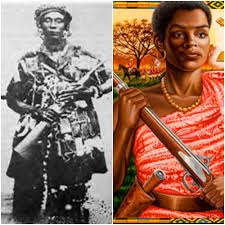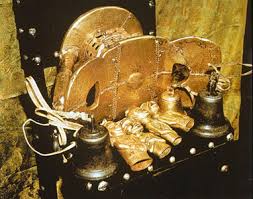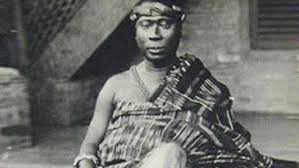Yaa Asantewaa 1: The Queen Mother Who Resisted British Colonial Rule.
Yaa Asantewaa I of Ghana, a forceful leader and symbol of resistance to British colonialism, is one of Africa’s most respected historical personalities. Yaa Asantewaa was born in 1840 in Besease, an Ashanti Empire (now Ghana) town. She rose to prominence in the late nineteenth and early twentieth century, during heavy warfare between the Ashanti people and British colonial forces. Her leadership during the Ashanti-British “War of the Golden Stool” (1900) cemented her legacy as a warrior queen and a potent emblem of African resistance to colonialism.
Early Life and Background.
Yaa Asantewaa was born into a royal family from the Ashanti Empire, a wealthy state noted for its military might and sophisticated political system. Her brother, Nana Akwasi Afrane Okpese, was the king (Omanhene) of the Edweso area in the Ashanti Empire. Yaa Asantewaa, as Queen Mother (an important political and spiritual role in Ashanti society), wielded great power within the empire’s matrilineal system, which granted women major political decision-making and administration authority.

Yaa Asantewaa was a successful farmer and entrepreneur renowned for her wisdom, strength, and leadership. Her early life was influenced by Ashanti traditional beliefs, and she was actively involved in her community’s political activities. When her brother died in 1894, Yaa Asantewaa assumed his responsibilities, becoming an even more prominent role in Ashanti politics.
The British and Ashanti Empire.
By the late nineteenth century, the British became increasingly interested in the Ashanti region due to its gold wealth and strategic location. The British attempted to annex the Ashanti Empire, resulting in multiple clashes between the two countries. By 1896, the British had exiled King Prempeh I of the Ashanti to the Seychelles and were consolidating their power in that region.
The British governor, Frederick Hodgson, further inflamed tensions by demanding the sacred Golden Stool of the Ashanti people—a symbol of the soul and unity of the Ashanti nation. To the Ashanti, this was an unacceptable insult and a violation of their sovereignty. The demand for the Golden Stool became the catalyst for what would later be known as the War of the Golden Stool.
The War for the Golden Stool (1900).
During this vital period, Yaa Asantewaa rose to prominence as the Ashanti resistance leader against British colonialism. At an Ashanti chiefs’ conference, many were apprehensive to confront the British army. Yaa Asantewaa used hot words to embarrass the male leaders into action. She was famously quoted as saying:
“If you, the Ashanti men, do not march forward, we will. We, as women, will. I’ll call on my fellow women. We’ll fight the white men. “We will fight until the last of us falls on the battlefields.”

This speech inspired the Ashanti chiefs, and under her guidance, they mounted a rebellion to safeguard their country, culture, and the Golden Stool. Yaa Asantewaa personally led the Ashanti army into combat, becoming one of the few women in African history to head an armed resistance against colonial soldiers.
The Ashanti forces besieged the British fortress in Kumasi, the Ashanti Empire’s capital. Despite their valiant efforts, the British, with greater artillery and reinforcements from other colonies, eventually overcame the Ashanti resistance. In 1901, Yaa Asantewaa was captured and, like King Prempeh I, was exiled to the Seychelles, where she spent the remainder of her life.
Legacy.
Yaa Asantewaa died in exile in 1921, but her reputation as a fierce fighter and symbol of resistance to imperialism lives on in Ghana and across Africa. Her role in the War of the Golden Stool, as well as her steadfast courage in the face of British dominance, have elevated her to the status of national hero. Kwame Nkrumah, Ghana’s first president, renamed a women’s training college after her in 1960, guaranteeing that future generations remember her contribution to Ghanaian history.
The Yaa Asantewaa Museum, located in her village of Ejisu, was founded in her honor to preserve her tale and commemorate her role in the Ashanti Resistance.
Yaa Asantewaa 1 life exemplifies African women’s fortitude and strength in the face of colonial persecution. Her leadership during the War of the Golden Stool not only inspired her contemporaries, but it also stands as an enduring emblem of resistance, resilience, and national pride. Yaa Asantewaa is still a famous character in Ghanaian history, representing the spirit of rebellion and independence.
References:
- Boahen, A. Adu. African Perspectives on Colonialism. Baltimore: Johns Hopkins University Press, 1987.
- Nwando Achebe, Female Monarchs and Merchant Queens in Africa. Ohio University Press, 2011.
- Wilks, Ivor. Asante in the Nineteenth Century: The Structure and Evolution of a Political Order. Cambridge University Press, 1975.

